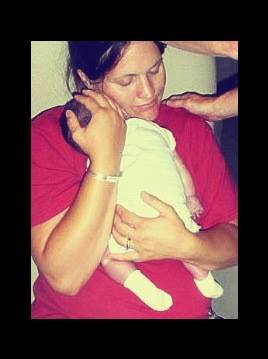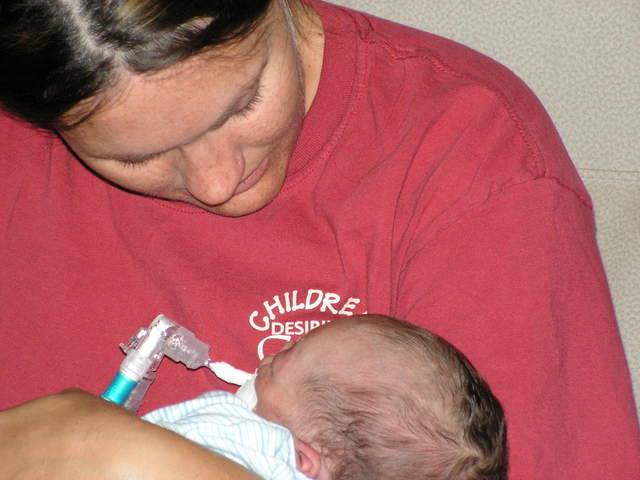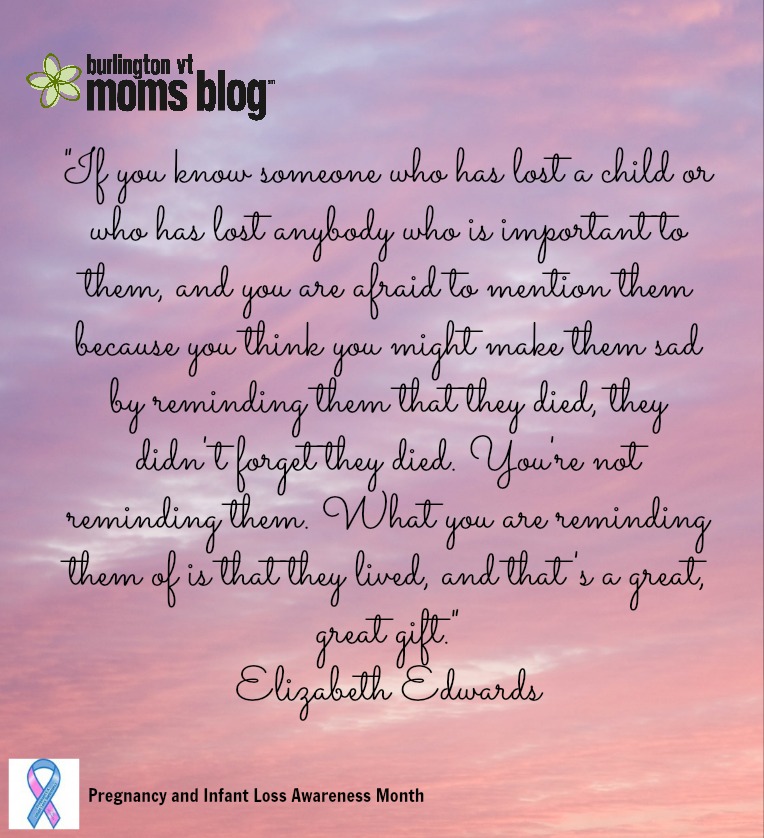A mother is impatiently counting down the days until her due date. Her belly protrudes to unbelievable proportions and vigorous kicking keeps her awake at night. Sometimes her husband can feel the kicking on his back as they lay next to each other in bed. A little corner of their room has been lovingly arranged with a bassinet, soft blankets, tiny clothes folded tenderly in a drawer. Everything is ready for the new baby and the anticipation is getting hard to bear!
One morning she’s woken early with contractions. By the time her husband gets up for work, she knows this is it! They leave their older daughter with the grandparents and head to the hospital.
Things are progressing quickly, and the mother has to focus hard to get through each wrenching contraction. She’s hardly aware of what’s going on around her as she’s changed into a hospital gown and taken to a bed. All she can think is, “This will be over soon and my baby will be here!”
Suddenly the nurse urgently calls for the doctor to come. The monitor shows baby’s heart rate decelerating. The room fills with concerned hospital staff, and before the parents know what is happening, the mother is being wheeled to the operating room. She is in transition now and all she understands amidst the pain is that her baby is in acute distress and he must be delivered immediately. She feels the overwhelming need to push. Before she can even be prepped for an emergency c-section, she delivers her baby in three mighty pushes. The father rushes into the OR in time to see a limp, blue baby being whisked away by the neonatal care team.
The parents are overwhelmed with shock and grief. They never expected anything like this would ever happen to them. Numbly they listen as different doctors and specialists tell them the worse – their baby won’t live. The next day they hold their child for the first and last time. He never moved, opened his eyes, or made a sound.
They try to memorize every detail of his tiny, perfect body. They smell his head, hold his hand, trace the curve of his button nose. The father places his hand across the baby’s chest and feels the heartbeat fade away.
The parents leave the hospital and head home with empty arms.
This is a true story; it’s my story. My husband and I experienced the death of our little son Matthias in 2005. Although we are grateful beyond belief that God carried us through this tragedy and has continued to heal our hearts, we still grieve for the loss of our son. His loss was the greatest pain we have ever been through.
The shock and grief that comes with the death of a child during pregnancy or after birth is like none other. Suddenly all the dreams and hopes of holding your baby for the first time, caring for your little child and watching him or her grow are crushed. Parents must tell friends and relatives that their baby has died, and each time they have to share the sad news their hearts break again.
So many women have experienced miscarriage, stillbirth, or neonatal death (death in the first 28 days of life). A mother may begin to bleed heavily early on in her pregnancy and discover she has miscarried. Or she hears the dreadful words, “There’s no heartbeat. I’m sorry, your baby had died” at an ultrasound appointment. Late in pregnancy she may suddenly cease to feel her baby moving, only to learn her baby has passed away inside her. Complications can happen during or after delivery that lead to the death of the child. But regardless of how or when a couple loses their child, the overwhelming grief of bereaved parents is the same.
When these heartbreaking situations happen to those we know and love, it can be hard to know how to respond. Grieving parents need the love, support and care of their friends and family to begin to heal from their loss. Here are a few things to keep in mind:
- “I don’t know what to say to my friend.” I hear this a lot, and I get it. I think the reason we don’t know what to say is that our initial reaction is to want to “make her feel better.” We want to fix things, to relieve her grief, to say something that makes everything better. But that can’t happen, and that shouldn’t be your goal. Often this idea makes people say things that are actually very painful to bereaved parents, like “You can always have another one” or “there was probably something wrong with the baby” or “at least you have your other child(ren).” You can’t make her pain go away. Don’t try.
- So what can you say? Acknowledge her grief. Be an empathetic listener. Let her know you are there for her. No one can take a grieving mother’s pain from her. No one can shoulder that heavy load for a little while to give her a break from the grief. In that sense, grieving is a solitary journey. Grieving is hard, and being close to someone who is grieving is hard. We often feel uncomfortable going there with someone. But instead of shying away from their pain or trying to take away their sadness, be willing to enter into it with them. You are saying, “I’m not afraid to travel this hard road with you.” (Some wonderful ideas of things to say to a grieving parent are listed here: http://www.babylosscomfort.com/what-do-i-say/ ).
- Remember Dad. The majority of focus and sympathy is usually given to the bereaved mother. Don’t forget that the father has also lost a child, and often has the added worry of caring for his partner. Be an ear for a grieving father. He needs support and has his own journey of grief to walk. My husband was blessed to have other men in his life who weren’t afraid to talk about the hard things, to listen, cry and support him.
- There is a huge physical toll that bereaved mothers are dealing with on top of the emotional pain. She has gone through a pregnancy. If she miscarried, she may have lost a lot of blood or had to have a surgical procedure done. If she experienced a later loss she had to go through full labor and birth, only to be left with empty arms. Often her milk supply will come in and she’ll experience engorgement with no baby to feed. It’s helpful to keep her need for postpartum healing in mind too. After the death of our baby, my mother gave me a gift basket of postpartum care items. They helped my body heal and brought comfort to my heart as well. (Earth Mama Angel Baby has a special line of Postpartum/Baby Loss gifts, if you’re looking for ideas of what to get a bereaved mother during her postpartum time.)
- One woman said that hearing others speak her child’s name was like music to her aching heart. Ask about their child. Use the baby’s name. Remember that the child who passed away is just as much a part of the family as any other children. If there are no other children, affirm to the mother that she IS still a mother. Once, several years after the death of our son, a relative at a family reunion asked me how many children I had. I was confused as to how to answer and finally said, “Three.” My dad was right there, and putting his arm around me he said, “Actually they have four. We have a grandson named Matthias in heaven.” It blessed my heart to know that I had family and friends who weren’t uncomfortable talking about my dear baby.
- There are days that are especially hard for grieving parents. Some are just random awful days, but you can be sure there are certain days that will always be difficult. The day the child was born, the day the child died, the mother’s due date, Father’s Day and Mother’s Day – these dates will bring fresh pain and sorrow even 10 years later. Write down these dates and send a card or make a phone call. Healing takes time, and remembering the life – even very brief life – of someone’s child helps so much with that healing.
And a few words to those of you who have experienced the death of a baby and are walking through this grief. I’m so sorry, I know how hard it is. Please find someone to talk to. Whether it’s online boards, a friend to talk to in person, or a local support group, don’t grieve alone. Allow yourself to grieve fully, with no timeline as to when you “should” be “better.” Your life will never be the same, but you will eventually come to a place of healing. When you are able, share your story. Talk about your baby. Don’t grieve in silence.
Thank you for allowing me to share my story, I hope it’s helpful. I believe that no grief or pain is ever wasted, and I know that through the loss of my little Matthias, I am able to share the comfort that I received.














[…] A Story Of Loss :: The Life and Death of Baby Matthias […]
Melissa, thank you so much for sharing your story with us. I hope and pray that it encourages many women who may experience something similar.
Melissa, my heart breaks for you. Thank you for sharing your story, that took so much courage. And thank you too for the tips on how to talk to and comfort your bereaved friend. I think we all need a reminder on how to be there for our grieving friends.
I’m so sorry. This is beautiful, and Matthias is beautiful. Peace to you.